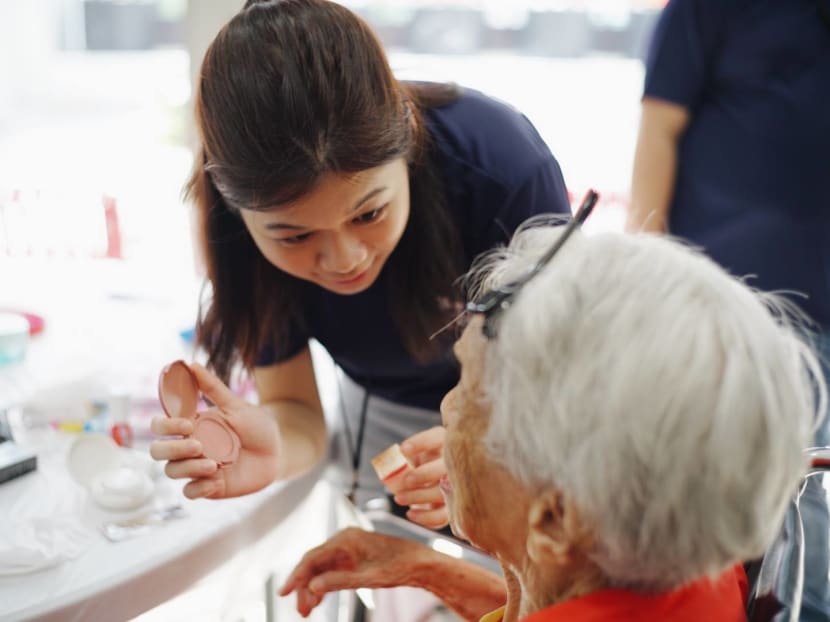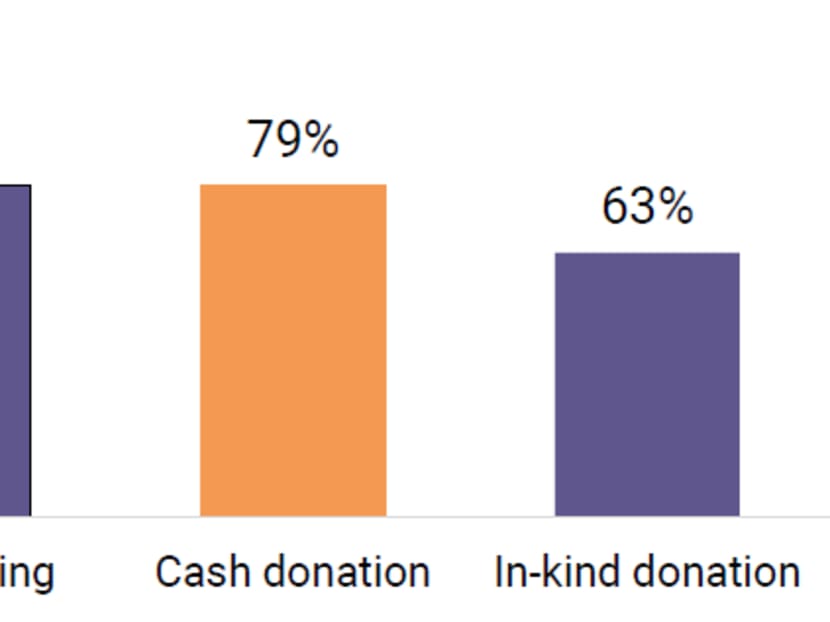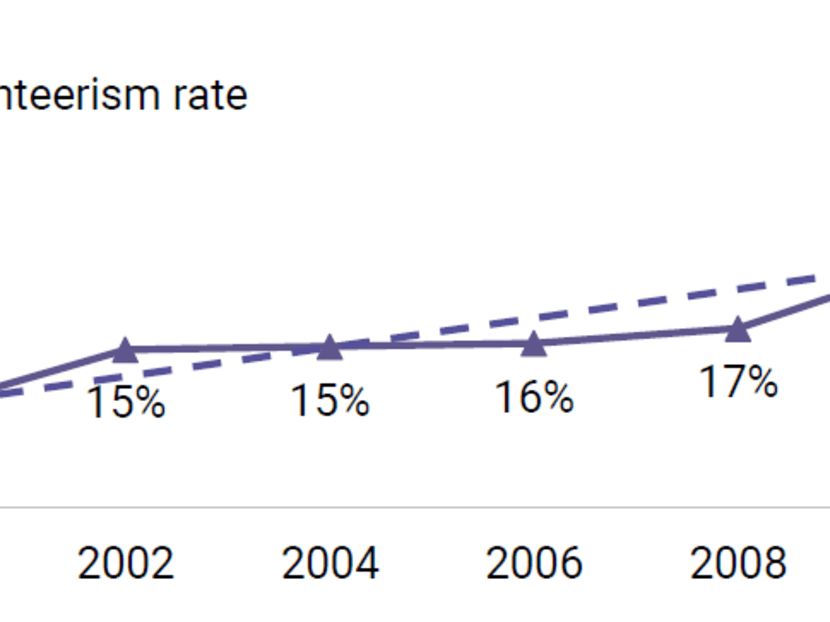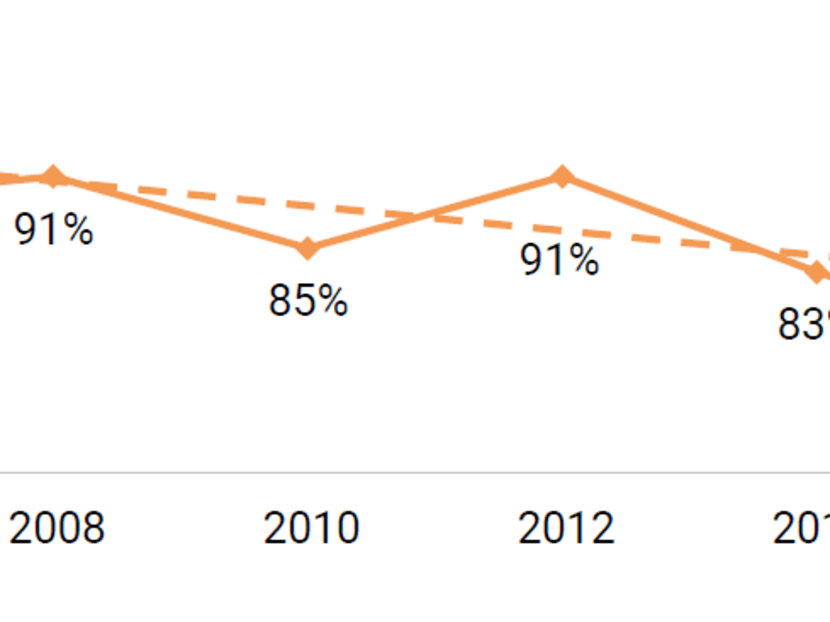Strong link between simple acts of kindness and volunteering, donating: Study
SINGAPORE — People who give up their seats to others on the train, return their trays after eating, or provide directions to a lost person, are more likely to engage in bigger acts of generosity, such as volunteering or donating to charities.

People who engaged in these small acts of kindness were about twice as likely to volunteer compared to those who did not.
SINGAPORE — People who give up their seats to others on the train, return their trays after eating, or provide directions to a lost person, are more likely to engage in bigger acts of generosity, such as volunteering or donating to charities.
These “micro-giving” acts of voluntary, spontaneous and everyday kindness were examined in 2018’s Individual Giving Survey by the National Volunteer and Philanthropy Centre (NVPC).
Speaking to reporters on Thursday (May 16), NVPC’s chief executive officer, Ms Melissa Kwee, said that micro-giving acts were a “catalyst to much more significant, sustainable and impactful giving behaviour”.
People who engaged in these small acts of kindness, for instance, were about twice as likely to volunteer compared to those who did not, and were 29 per cent more likely to make cash donations.
The national study also found:
Volunteerism rates have increased over the past decade
Donation rates have declined generally, although total donation amounts have grown
Most people in Singapore have the intention to volunteer and/or donate
A growing trend of former volunteers who cease their involvement
The NVPC has conducted the biennial study since 2000. A total of 2,100 respondents were surveyed from August to November last year, with 18 further face-to-face in-depth interviews in January and February this year.
GIVING ON A SPECTRUM

The most common types of giving behaviours were micro-giving and cash donations, engaged in by almost eight in 10 Singaporeans.
Other findings showed that people who engaged in those small acts of kindness were more likely to participate in varied giving activities, with an average of 2.5 types. Non micro-givers, meanwhile, came in at an average of 1.3 types.
Micro-giving as the top behaviour provides a “good starting point” for bigger, more meaningful actions, said Mr Jeffrey Tan, director of knowledge, marketing and advocacy at NVPC.
“The moment you start doing (these smaller actions), there’s data to prove that something psychologically and physiologically changes in your brain, making you think differently. It’s a real phenomenon that giving is receiving,” added Mr Tan.
MORE VOLUNTEERISM

In spite of fluctuations, volunteerism rates in Singapore have been increasing gradually over the past decade. Almost a third of Singaporeans volunteered in 2018, up from just 17 per cent in 2008.
The growth can be attributed to overall mindset changes as well as external events leading to spikes in certain years, said Mr Tan.
He cited “high visibility campaigns” such as the Graciousness on Public Transport campaign, launched in 2009, and the inaugural Youth Olympic Games in 2010, which served as a “strong rallying call” for volunteers.
Then in recent years, nationwide events such as the passing of Lee Kuan Yew and SG50 celebrations helped “foster a common identity” among Singaporeans, leading to the spike in 2016, added Mr Tan.
FEWER DONORS, BUT MORE MONEY GIVEN

The overall donation rate among Singaporeans has seen a general decline from 91 per cent in 2008 to 79 per cent last year, possibly owing to economic sentiment, said Mr Tan.
He said: “Financial security is among the top three life priorities for Singaporeans, suggesting that in times of perceived economic uncertainty, more may hold back on cash giving.”
However, the average contribution rate has more than doubled from S$300 in 2008 to S$661 in 2018, with total donation amounts growing from S$0.96 billion to S$2.11 billion over the decade as well.
GOOD WILL
The study also found that most Singaporeans had altruistic views. Out of every 10 respondents, seven had the intention to volunteer in the future, and nine to donate.
But respondents were also pragmatic, said NVPC. When asked about life priorities, they ranked family commitments, good health and and financial security at the top. Contributing to society came in at 14th place.
Two-thirds were interested in practical volunteer opportunities that benefited them, including activities located near their homes (34 per cent) and those aligned with their hobbies and interests (29 per cent).
“This suggests an opportunity for social organisations and charities to tap into individuals’ innate willingness to give,” said NVPC.
For example, they could offer practical solutions such as location-based volunteerism, or activities that can be done with family or colleagues.
FORMER VOLUNTEERS
Another growing trend is the number of former volunteers — people who had previously volunteered but not in the past 12 months.
Over half of former volunteers (53 per cent) indicated that their volunteering experience had not met their expectations, with the most commonly cited reasons being a lack of flexibility (28 per cent) and a perception that the activity had little impact or meaning (25 per cent).
Many who stopped volunteering also indicated that school and work (44 per cent), leisure and learning new skills (37 per cent) and family (33 per cent) were key priorities, resulting in less time for volunteering opportunities.
Former volunteer Ally Lee told TODAY that she had stopped mainly owing to a lack of time, but also that the experience had not been as “smooth-sailing”, given internal conflicts within the organisation.
“Sometimes there were too many administrative and regulatory procedures in place before we could even carry out the activity. And if we accidentally made any mistakes the supervisor would be very unhappy with us,” said Ms Lee, 23.
But ultimately, interactions with elderly and underprivileged kids had left a mark and Ms Lee looks forward to continuing her volunteering.
“Looking back I’m quite disappointed that I let my studies and work take precedence over contributing to the community. Now that I’m more free I’ll definitely start again.”






